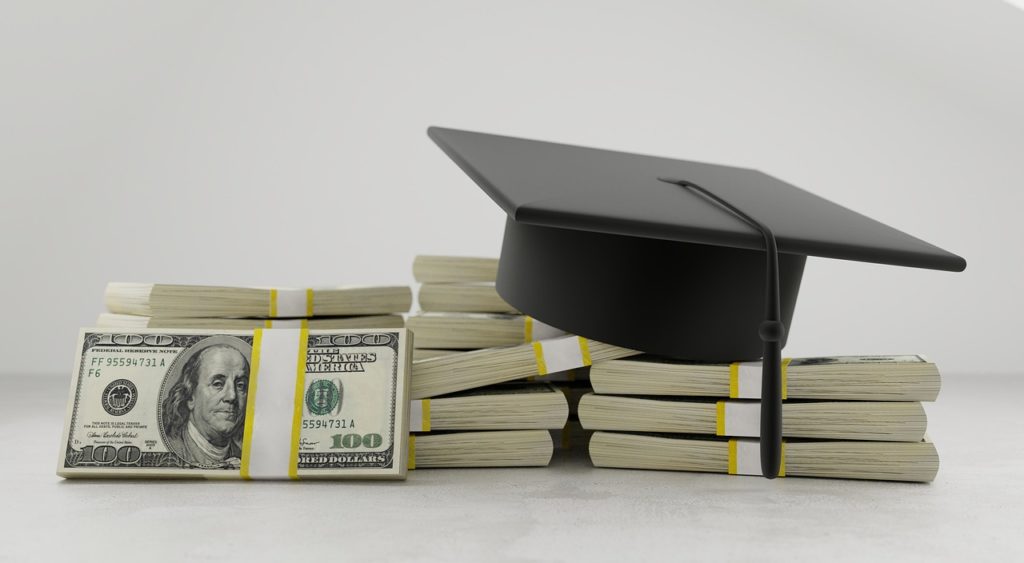The majority of college students today will need to include student loans in the big “paying for college” picture. Hopefully, loans are a small piece of a puzzle which includes scholarships, aid, savings, tax planning, and cash flow. After graduation years down the road, the graduate may find themselves in a position to consider paying off their loans early and getting out from under that debt. Should they?
Is paying off students loans early a good idea?
If you Google: Should I pay off my student loans early? you’ll find articles on both sides of the subject. So, what do you need to consider?
First, what are some benefits to paying off loans early? Paying off loans early saves the potential interest you would end up paying if you went the full life of the loan–probably thousands of dollars. Not living with the month-to-month debt obligation increases your cash flow.
Student loan debt today is causing people to put off buying a home, getting married, having children, and saving for retirement. The money sent to student loans each month is money that could be put to better use, like saving for emergencies or investing for the future. Having a lower debt to income ratio makes it easier to get a loan for a house, make other purchases, or build your wealth.
If you are a worrier (and even if you’re not), having lower (or no) debt can be good for your health. The financial burden of debt is stressful for most people. Living debt free can be extremely liberating.
Potential cons of paying off your debt early
You lose the interest rate tax deduction you might receive. In 2018, the IRS allows for taxpayers to claim up to $2,500 in paid student loan interest payments on federal taxes. This interest deduction can be from both federal and private student loans. To claim the deduction, you must meet certain qualifications including:
- Must be legally obligated to make payments (You’re not making payments for someone else.)
- Must have paid the interest in the tax year you are filing.
- Did NOT file as married filing separately
- Modified adjusted gross income is less than $70,000 (single) or less than $145,000 (married, filing jointly).
- You are not a dependent for someone else.
Another downside to consider…student loan debt is low interest debt. Student loan rates are usually pretty low compared to other forms of debt. Could it be called “good” debt? If you are straddled with credit cards or car loans, paying off these debts first makes better financial sense. Private student loans will probably have higher interest rates than federal loans. Pay the minimum amount due on your lower interest rate loans and apply any “extra payment” you can work into your budget towards the highest interest loan until it is paid off. Then repeat this process to eliminate the next highest interest rate obligation, and so on.
What details need to be taken into account when thinking about accelerating paying them off?
Do student loans have a prepayment penalty? Luckily, both federal and private student loans are exempt from prepayment penalty. Paying off student loans will not cost anything extra.
Contact your loan servicer to find out how they handle extra student loan payments. Will they apply it to the balance? Make sure they are applying any extra payments to the principal.
Set up automatic payments at a higher amount and not have to think about it each month. Perhaps make payments every two weeks instead of once a month.
Since interest accrues on a daily basis, make payments at the beginning of the month to shave a bit off the principal.
How to make the final decision?
The final decision of whether or not to pay off your student loan debt early depends on your financial situation.
- Do you have money saved for emergencies?
- Are you saving at least up to the company match in your at work retirement plan?
- Have you paid off any higher interest debt like credit cards?
- What are your long term financial goals?
Examine the interest rate you are paying on your student loans. Is it higher than the potential rate you could be earning on that money if you invested it? However, would you be happier knowing that your debt is paid off even if that money could be earning slightly more for you invested?
You may decide it is best to live without debt so make a plan and tackle it…highest interest rates first… extra principal payments each month (even an extra $20, $50, or $100 can help), and leave that student loan debt in the past.



